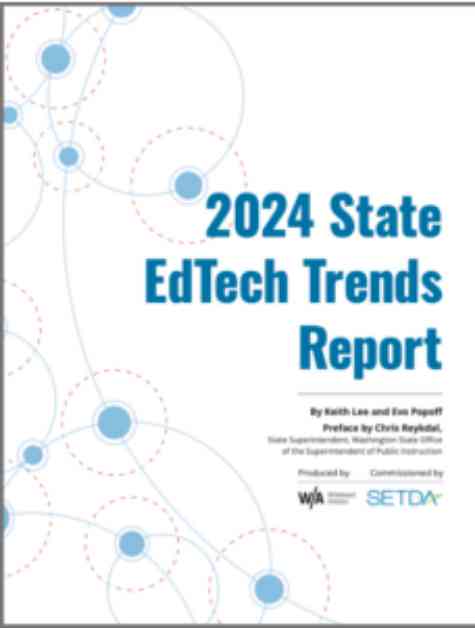State of EdTech: Trends and Innovations in Education Technology
SETDA, the member association representing state and territorial educational technology and digital learning leaders, recently released its highly anticipated 2024 State EdTech Trends Report. This report offers valuable insights into the top priorities in educational technology as identified by state policy-makers, including state edtech directors, superintendents, commissioners of education, and CIOs.
The survey conducted by SETDA collected information from state leaders in 46 states, focusing on key themes outlined in the 2024 National Educational Technology Plan released by the Office of Educational Technology at the U.S. Department of Education. This collaborative effort between SETDA and Whiteboard Advisors highlights the innovative work being done by state leaders in Indiana, Kentucky, Maine, Virginia, and Washington.
One of the major highlights of the report is the growing importance of Artificial Intelligence (AI) in education. The survey revealed that 92% of respondents in 2024 reported increased interest in AI compared to 54% in the previous year. Additionally, approximately half of the respondents indicated that their state has developed AI guidance over the past year. This surge in interest underscores the potential for AI to transform teaching and learning in K-12 classrooms.
Cybersecurity also remains a top priority for state education agencies, with 24% of respondents highlighting it as a key concern. While this percentage saw a slight decrease from the previous year, the need to secure school networks and data remains a critical issue for educators and policymakers.
Another key area of focus for state leaders is broadband access and device availability for students. The report revealed that 85% of respondents took steps to improve home broadband access and device availability for students during the 2023-24 school year. This includes efforts to bridge the digital divide and ensure that all students have equitable access to online learning resources.
Funding and sustainability are also major considerations for state education agencies. Only 27% of respondents indicated that they have plans to sustain funding for projects supported by ESSER/ARP funds, highlighting the uncertainty surrounding the long-term sustainability of edtech initiatives.
Julia Fallon, Executive Director of SETDA, emphasized the importance of collaboration and a sustained commitment to edtech effectiveness and equity. She noted, “State education agencies are evolving to meet the demands of a digital, modern world while navigating the uncertainty created by emerging technologies like artificial intelligence.” Fallon also highlighted the impactful work being done by the Office of the State Superintendent of Public Instruction in Washington, which is supporting the use of AI in classrooms through collaboration with local administrators and school leaders.
As state leaders continue to adapt to the changing landscape of education technology, the stories from states like Indiana, Kentucky, Maine, Virginia, and Washington serve as examples of effective collaboration and innovation. By showcasing the positive impact of these initiatives, SETDA hopes to inspire other state leaders to prioritize edtech effectiveness and equity in their own education systems.
In conclusion, the 2024 State EdTech Trends Report provides valuable insights into the current state of education technology and highlights the innovative work being done by state leaders across the country. By focusing on key areas such as AI, cybersecurity, broadband access, and funding sustainability, educators can better prepare students for success in a digitally driven world.
For more information on the latest trends and innovations in education technology, stay tuned to our news site for updates and analysis from industry experts.

